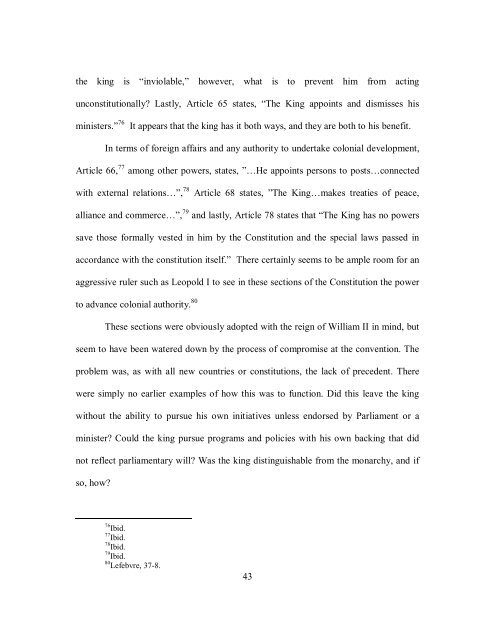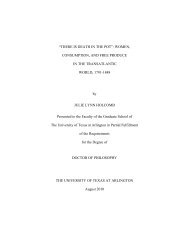EARLY BELGIAN COLONIAL EFFORTS - The University of Texas at ...
EARLY BELGIAN COLONIAL EFFORTS - The University of Texas at ...
EARLY BELGIAN COLONIAL EFFORTS - The University of Texas at ...
You also want an ePaper? Increase the reach of your titles
YUMPU automatically turns print PDFs into web optimized ePapers that Google loves.
the king is “inviolable,” however, wh<strong>at</strong> is to prevent him from acting<br />
unconstitutionally? Lastly, Article 65 st<strong>at</strong>es, “<strong>The</strong> King appoints and dismisses his<br />
ministers.” 76 It appears th<strong>at</strong> the king has it both ways, and they are both to his benefit.<br />
In terms <strong>of</strong> foreign affairs and any authority to undertake colonial development,<br />
Article 66, 77 among other powers, st<strong>at</strong>es, ”…He appoints persons to posts…connected<br />
with external rel<strong>at</strong>ions…”, 78 Article 68 st<strong>at</strong>es, ”<strong>The</strong> King…makes tre<strong>at</strong>ies <strong>of</strong> peace,<br />
alliance and commerce…”, 79 and lastly, Article 78 st<strong>at</strong>es th<strong>at</strong> “<strong>The</strong> King has no powers<br />
save those formally vested in him by the Constitution and the special laws passed in<br />
accordance with the constitution itself.” <strong>The</strong>re certainly seems to be ample room for an<br />
aggressive ruler such as Leopold I to see in these sections <strong>of</strong> the Constitution the power<br />
to advance colonial authority. 80<br />
<strong>The</strong>se sections were obviously adopted with the reign <strong>of</strong> William II in mind, but<br />
seem to have been w<strong>at</strong>ered down by the process <strong>of</strong> compromise <strong>at</strong> the convention. <strong>The</strong><br />
problem was, as with all new countries or constitutions, the lack <strong>of</strong> precedent. <strong>The</strong>re<br />
were simply no earlier examples <strong>of</strong> how this was to function. Did this leave the king<br />
without the ability to pursue his own initi<strong>at</strong>ives unless endorsed by Parliament or a<br />
minister? Could the king pursue programs and policies with his own backing th<strong>at</strong> did<br />
not reflect parliamentary will? Was the king distinguishable from the monarchy, and if<br />
so, how?<br />
76 Ibid.<br />
77 Ibid.<br />
78 Ibid.<br />
79 Ibid.<br />
80 Lefebvre, 37-8.<br />
43
















